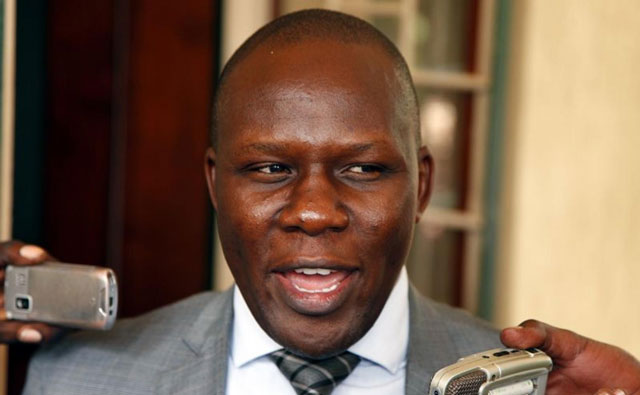
Kampala, Uganda | THE INDEPENDENT | The Physical Infrastructure committee of Parliament has re-emphasized the need for the liberalization of the mandatory motor vehicle inspection programme.
The committee notes that inspection should be liberalized in a manner that allows established vehicle dealerships with a potentially superior vehicle testing capacity for specific vehicles such as Toyota, Mercedes Benz and Mitsubishi to offer specialized mandatory motor vehicle inspection services.
This recommendation is contained in the committee’s report on the status of implementation of recommendations in the committee report on the inquiry into the mandatory inspection of motor vehicles in Uganda.
The report which was adopted by MPs was laid on the floor of the house by the chairperson of the committee Eng. Robert Sekitoleko during a plenary session on Friday.
The mandatory vehicle inspection was contracted to a Swiss company Société Générale de Surveillance (SGS) in 2015.
In November 2016, the company commenced the services but in 2017 Parliament directed the Committee on Physical Infrastructure to investigate the company activities and consequently suspended the enforcement of the services until several issues were resolved. The committee submitted its report to Parliament on 13th February 2018 with recommendations.
On July 1, 2020, the Minister of Works and Transport presented a brief on the status of the mandatory motor vehicle inspection project. The Speaker Rebecca Kadaga referred the matter back to the Committee on Physical Infrastructure to ascertain whether the recommendations had been addressed.
Sekitoleko while presenting the report on Friday noted that during interaction with the committee officials from Ministry of Works and Transport maintained that the current model of mandatory motor vehicle inspection by an independent inspection entity was geared towards segregation of the roles of motor vehicle repairs from inspection to avoid a potential conflict of interest.
According to the committee, the Ministry further indicated that motor vehicle inspection services would create a demand for vehicle repair facilities, genuine spare parts and mechanics from both formal and informal sectors thereby facilitate job creation.
However, Sekitoleko asserted that the committee believes that liberalization of the mandatory inspection will afford Ugandans more employment opportunities than the current monopoly arrangement with SGS given that the service provider directly employs only 55 Ugandans in all its inspection sites and repatriates their entire profit from the 9O% of gross revenue collected since only 10% is transferred to the government in form of concession fees.
Ministry of works officials further informed the Committee that motor vehicle inspection would be opened to other players upon recovery of the investment by SGS. The Committee was further informed that the Auditor General is conducting a verification audit of SGS’s initial investment which will form the basis for determining the recovery period of SGS’s investment.
The Committee however noted in its report that it is typical for government to extend concession agreements of this nature with private service providers for infinite periods despite public outcry regarding exorbitant pricing of services by such private providers.
The report cites UMEME and Face Technologies whose contracts are still running to date.
The ministry of works informed the committee during interactions that Cabinet on 24th February, 2O2O, with guidance from the Ministry of Justice and Constitutional Affairs drafted Addendum No.1 to the Contract for the provision of Mandatory Motor Vehicle Inspection Services which was subsequently signed by the parties on 8th April, 2O2O.
However, the report states that Clause 6 of Addendum No.1 empowers the Joint Committee (comprising of the Contract Management team and representatives of the provider) to periodically review (i.e. once every quarter) the inspection fees and agree on any revisions of the fees. According to MPs on the committee however, this provision is prone to abuse and is likely to result in the arbitrary increment of inspection fees.
The Committee recommends that Clause 6 of the addendum should be revisited such that any future adjustment of inspection fees should be effected after tabling of the requisite statutory instrument before Parliament for scrutiny.
The first committee report noted that without the adequate involvement of NEMA and functional information sharing synergies with NEMA in setting, monitoring and evaluating parameters of exhaust emissions, the contribution of the mandatory inspection of motor vehicles by SGS to climate change mitigation and adaptation would be difficult to determine.
Sekitoleko told the house that NEMA is now represented on the project management committees for the SGS contract, and the ministry of works has initiated steps geared towards the establishment of information sharing system between SGS and relevant government institutions including NEMA, however, the Committee reiterates that in addition to contract supervision and information sharing, NEMA should be involved in setting, monitoring and evaluating parameters for testing exhaust emissions to ensure compliance with the set environmental standards.
The Minister of Works Gen. Katumba Wamala did not object to the recommendations and urged MPs to adopt the report.
********
URN
 The Independent Uganda: You get the Truth we Pay the Price
The Independent Uganda: You get the Truth we Pay the Price



